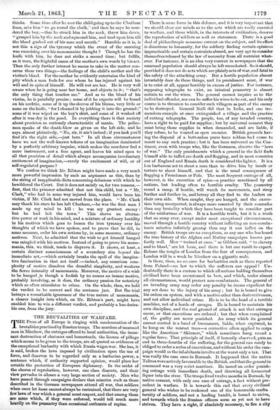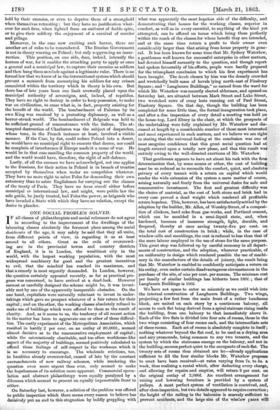THE BRUTALITIES OF WARFARE.
THE Press of all Europe is ringing with condemnation of the brutalities practised by Russian troops. The murders of unarmed men in lliechow, the outrages offered to local authorities, the inces- sant destruction of chateaux and homesteads, the licence of pillage which seems to be given to the troops, are all quoted as evidences of the exceptional barbarity with which Russia wages war. She has, it is said, broken the laws imposed by civilization upon the use of force, and deserves to be regarded only as a barbarian power, a sentence which, if authority supported opinion, would place her outside the protection of European diplomacy. In the midst of the chorus of reprobation, however, one class dissents, and their view pervades in silence a very large section of society. Men who have passed through campaigns declare that miseries such as those described in the German newspapers attend all war, that soldiers when once let loose cannot always be restrained, that there are very few laws of war which a general must respect, and that among them are some which, if they were enforced, would tell much more heavily on the peasantry than occasional outbursts of rapine.
There is some force in this defence, and it is very important that we should clear our minds as to the acts which are really essential to warfare, and those which, in the interests of civilization, deserve the reprobation of soldiers as well as statesmen. There is a good deal of philanthropic nonsense current on the subject, and its effect is disastrous to humanity, for the soldiery finding certain opinions impracticable and certain restraints absurd, are very apt to consider themselves released by the law of necessity from all restraint what- ever. For instance, it is an idea very current in newspapers that the unarmed population should always be left unmolested. So it should, provided it does not do acts which are plainly acts of war, and fatal to the safety of the attacking army. But a hostile population almost invariably does do these things, and its punishment must, if war is to exist at all, appear horribly in excess of justice. For instance, supposing telegraphs to exist, an inimical peasantry is almost certain to cut the wires. The general cannot inquire as to the individual offender, nor can he suffer his wires to be cut, and his only course is to threaten to consider such villagers as part of the enemy to be destroyed. General Neill did that in India, and one tre- mendous example at once extinguished a village and the practice of cutting telegraphs. The people, too, of any invaded country, have a right to be paid for supplies ; but by universal consent they must bring those supplies in when demanded, and are liable, if they refuse, to be treated as open enemies. British generals hav- ing the disposal of a bottomless purse have seldom had cause to resort to any such practice ; but it has been universal on the Con- tinent, even with troops who, like the Germans, observe the "laws of war." The only punishments which a general in the field finds himself able to inflict are death and flogging, and in most countries out of England and Russia death is considered the lighter. It is a less barbarous act to shoot a man than to drive him by insult or torture to shoot himself, and that is the usual consequence of flogging a Frenchman or Pole. The most frequent outrage of all, however, is the execution of spies—a practice sanctioned by all nations, but leading often to horrible cruelty. The peasantry round a camp, if hostile, will watch its movements, and stray further and further in, and betray all they find to the leaders on their own side. When caught, they are hanged, and the execu- tion being unexpected, is always more resented by their comrades than any brutality which they have been taught to consider part of the misfortune of war. It is a horrible truth, but it is a truth that no army ever, except under most exceptional circumstances, moved through a hostile country without inflicting on non-comba- tants miseries infinitely greater than any it can inflict on the enemy. British troops are no exceptions, as any one who has heard the true history of the Afghan and Mutiny campaigns knows per- fectly well. Men "trained at once," as Gibbon said, "to slavery and to blood," are let loose, and there is but one result to expect. Release the roughs of London from the fear of consequences, and London will in a week be Miechow on a gigantic scale.
Is there, then, no cei.sure for barbarities such as those reported from Poland—no law to which the sufferers can appeal ? Un- doubtedly there is a custom to which all nations holding themselves civilized have been accustomed to bow, and which, under almost all circumstances, would protect non-combatants. The general of an invading army may order any penalty he deems expedient for any act done to the injury of his army ; but he is bound to give his orders on system, and with a motive other than destructiveness, and not allow individual crime. He is to be the head of a terrible machine, not of a horde of savages. He is bound to maintain his own discipline, and the real ground of attack is not that outrages occur, or that executions are ordered ; but that when complained of, the guilty are never punished. An army which its general cannot control is a band of buccaneers, liable, when captured, to be hung on the nearest trees—a corrective often applied to corps like the American "Skinners," which sometimes hang round a regular force. That principle of itself, if honestly observed, puts an end to three-fourths of the suffering, for the general can rarely be obliged to order a series of executions, andwithout his order the cam- paign would to the inhabitants involve at the worst only a tax. That was really the case once in Biumah. It happened that the native Wines were actively favourable to the British, and that the general in command was a very strict martinet. He issued an order punish- ing outrage with immediate death, and throwing all fermented liquor into the river. The troops lived twelve months in Burmah, by native consent, with only one case of outrage, a fact without pre- cedent in warfare. It is towards this end that every civilized general who wishes to be reckoned one of the honourable confra teniity of soldiers, and not a leading bandit, is bound to strive, and towards which the Russian officers seem as yet not to have striven. They have a right, if absolutely necessary, to fire a city held by their enemies, or even to deprive them of a stronghold when themselves retreating ; but they have no justification what- ever for such fires, when lighted from an outburst of feeble spite, or to give their soldiery the enjoyment of a carnival of murder and pillage.
Moreover, in the case now exciting such horror, there are another set of rules to be remembered. The Russian Government is not in theory warring on Poland ; but only soppresang an insur- rection. This position, on one side, does, indeed, intensify the horrors of wax, for it enables the attacking party to apply at once a general and a municipal law, to capture their enemies as soldiers and then hang them as rebels against a legitimate ruler. There is no formal law that we know of in the international system which should prevent a monarch from amnestying his soldiers for any crimes committed within the territory which in theory is his own. But there has of late years been one limit avowedly placed upon the municipal authority of sovereigns, and, indeed, of republics. They have no right to destroy in order to keep possession, to make war on civilization, to erase what is, in fact, property existing for the benefit of the world. The bombardment of Palermo by its own King was received by a protesting diplomacy, as well as a horror-struck world. The bombardment cf Belgrade was held to be sufficient ground of remonstrance with the Sultan. The at- tempted destruction of Charleston was the subject of despatches, whose tone, in the French instance at least, involved a visible menace. If the Czar, by Bat, could reduce Poland into a desert, he would have no municipal right to execute that decree, nor could he complain of interference if Europe made it a cause of war. He would be in that case assailing the common property of the world, and the world would have, therefore, the right of self-defence.
Lastly, of all the excuses we have acknowledged, not one applies to the Russians, for their action in Poland is in breach of treaties accepted by themselves when under no compulsion whatever. They have no more right to sabre Poles for demanding their own autonomy than to sabre Englishmen for carrying out the clauses of the treaty of Paris. They have no locus standi either before municipal or international law, and might, were public law the sole guide, be justly treated, had Poles the power, as brigands who have invaded a State with which they have no relation, except the desire to plunder.































 Previous page
Previous page